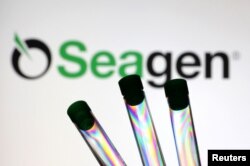Pfizer Inc PFE.N struck a $43 billion deal for Seagen Inc SGEN.O to add innovative targeted therapies to its portfolio of cancer treatments as it braces for a steep fall in COVID-19 product sales and stiff competition for some top sellers.
Monday's deal, Pfizer's biggest in a string of acquisitions following a once-in-a-lifetime cash windfall from its COVID-19 vaccine and pill, will add four approved cancer therapies with combined sales of nearly $2 billion in 2022.
Washington-based Seagen is a pioneer of antibody-drug conjugates, which work like "guided missiles" designed for a targeted destructive effect and spare healthy cells.
The deal helps Pfizer move into an area "that it is more protected from regulators, patent perspectives and market dynamics," Chief Executive Officer Albert Bourla said in a conference call.
Seagen, Bourla said, is set to benefit from out-of-pocket health care spending caps for older Americans under President Joe Biden's Inflation Reduction Act (IRA), meaning more patients could have access to the company's expensive treatments.
A focus on complex biotech medicines also provides a longer exclusivity on the market versus pills before becoming subject to government price limits under the IRA, he said.
Pfizer will pay $229 in cash per Seagen share, a 32.7% premium to Friday's closing price. Seagen's shares rose to $200 in early trading.
The latest deal comes as Pfizer seeks to mitigate an anticipated $17 billion hit to revenue by 2030 from patent expirations for top drugs and decline in demand for its COVID products.
The drugmaker expects more than $10 billion in sales from Seagen products in 2030, and another $15 billion from its other recent acquisitions.
Pfizer's recent deals include its purchase of Global Blood Therapeutics for $5.4 billion, migraine drug maker Biohaven Pharmaceutical Holding for $11.6 billion, and a $6.7 billion buyout of drug developer Arena Pharmaceuticals.
Pfizer's portfolio of oncology therapies includes 24 approved drugs, while Seagen's includes Adcetris for lymphoma, Padcev for bladder cancers, Tivdak for cervical cancer and breast cancer treatment Tukysa.
The companies expect to complete the deal in late 2023 or early 2024. Pfizer said antitrust regulators could closely review the deal due to its size but eventually approve it.
Pfizer rival Merck & Co Inc MRK.N and Seagen were in advanced deal talks last year but those reportedly collapsed over antitrust concerns.

